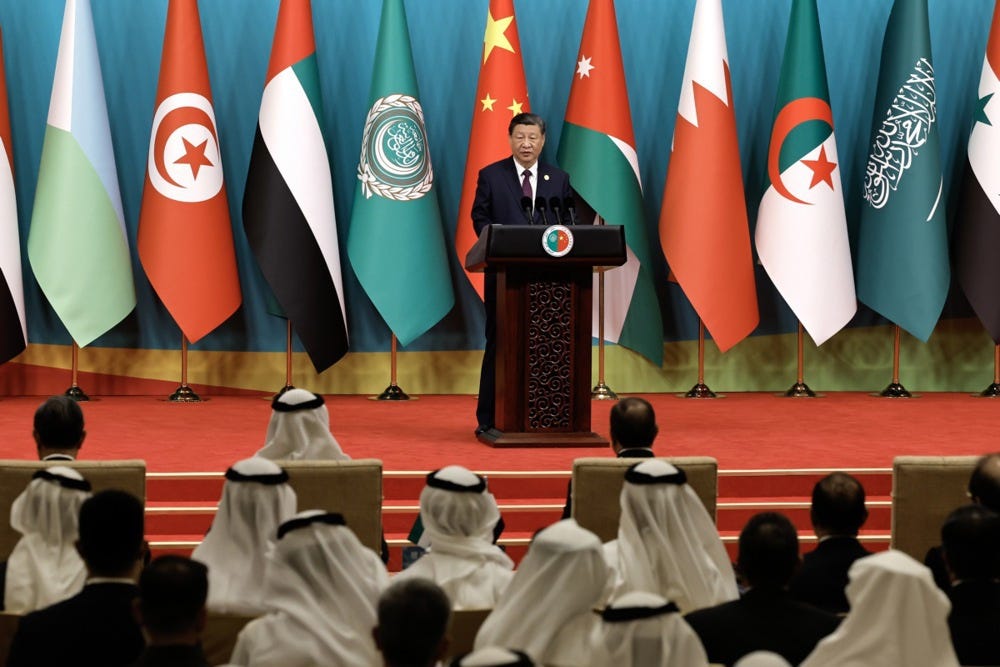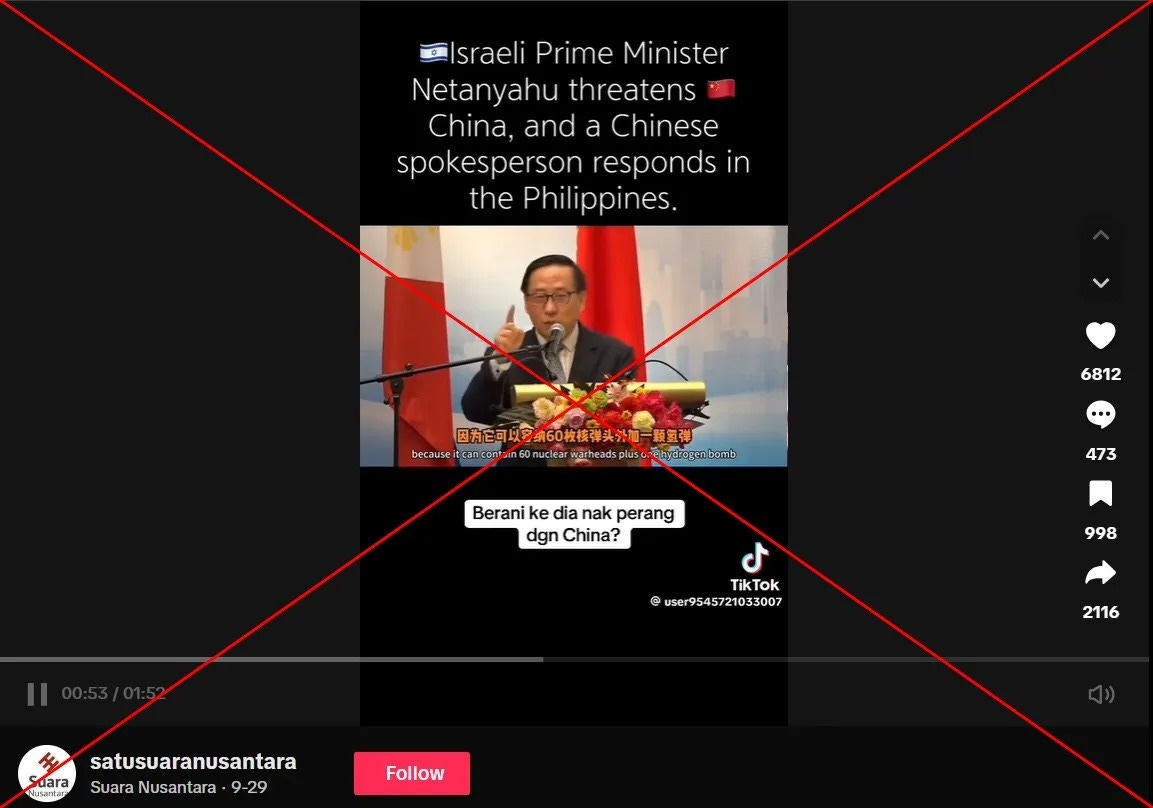The China in MENA Brief - October 27, 2025
Backing Iran, wooing Saudi Arabia, and trolling the world online
1. China Backs Iran’s Move to End UN Oversight, Undermining Western Nuclear Leverage
In a joint letter to the International Atomic Energy Agency (IAEA), Iran, China, and Russia formally declared the expiration of UN Security Council Resolution 2231, which underpinned the 2015 nuclear deal (JCPOA).
According to Iranian Deputy Foreign Minister Kazem Gharibabadi, all provisions of the resolution expired on October 18, 2025, ending the IAEA’s authority to monitor Iran’s nuclear activities.
The letter, which follows an earlier communication to the UN Secretary-General, denounces Western efforts by Britain, France, and Germany to trigger the “snapback” sanctions mechanism as illegal. By supporting Tehran’s position, Beijing signals its intent to erode Western legal and diplomatic instruments used to constrain adversaries.
Strategic Takeaways
Beijing’s Legal Warfare Against U.S. Sanctions Architecture
By co-signing the end of Resolution 2231, Beijing is directly contesting the legitimacy of Western-led enforcement frameworks. This aligns with its broader goal of creating parallel legal interpretations that weaken international compliance mechanisms rooted in Western norms.Erosion of Western Leverage on Iran’s Nuclear Program
The expiration of Resolution 2231 effectively strips the West of its remaining monitoring and enforcement tools. China’s support ensures Iran will continue to access diplomatic and economic cover from two UN Security Council members, making renewed sanctions or inspections nearly impossible to enforce.Consolidation of the China–Russia–Iran Bloc
This coordinated legal move marks a new phase in the Beijing–Moscow–Tehran axis: from transactional alignment to structural defiance of Western power. China now positions itself not just as Iran’s economic partner, but as its institutional shield.
2. Saudi Arabia’s AI Revolution Is Opening a Digital Door for China
China’s shadow looms over Saudi Arabia’s plan to turn oil wealth into artificial intelligence power. Through Humain, a state-backed firm created in May by Crown Prince Mohammed bin Salman, Riyadh aims to capture 6 percent of global AI workloads by building massive data center complexes along both coasts. The initiative mirrors China’s model of state-led technological development, where infrastructure, capital, and centralized governance are fused to project influence.
As Saudi Arabia negotiates with OpenAI, Amazon, Microsoft, Oracle, and Elon Musk’s xAI, its growing cooperation with Chinese firms exposes a deeper tension in U.S. policy.
Beijing’s Digital Silk Road already links much of Asia, Africa, and the Middle East through data and cloud infrastructure. By engaging both American and Chinese technology ecosystems, Riyadh is positioning itself as a pivotal actor in the global AI race, one that could either align with U.S. strategic aims or expand China’s digital reach across the Gulf.
Strategic Takeaways
Saudi Arabia’s Digital Ambition Challenges U.S.–China Tech Containment
Riyadh’s entry into the AI infrastructure race undermines Washington’s binary “with us or against us” framework in technology competition. By courting both American and Chinese firms, the kingdom is positioning itself as a neutral power broker in the global compute economy, much as it balances in energy markets.The Gulf as the New Frontline of Tech Geopolitics
Cheap energy, strategic geography, and sovereign wealth give Gulf states unique leverage over global AI supply chains. As data centers replace oil fields as critical assets, Saudi Arabia and the UAE are competing to define the region’s digital order, each seeking to anchor its economic future in compute infrastructure rather than hydrocarbons.Risks of Overreach and Dependency
The scale of Saudi ambitions may exceed its technical capacity. A shortage of domestic AI expertise, potential U.S. export restrictions, and oversupply in global data infrastructure could limit returns.
3. China Exploits Viral Misinformation to Project Power and Intimidate Rivals
A viral video circulating on TikTok falsely claims to show a Chinese government spokesperson threatening war in response to remarks by Israeli Prime Minister Benjamin Netanyahu.
In reality, the man in the clip is a deputy from a Beijing-based think tank speaking at a forum in the Philippines. The speech—warning that “if you want to have war, you will get war” and that “China will not fire the first shot, but will not allow you to fire the second”—was not directed at Israel but has been manipulated to appear as an official response.
While Beijing has denied involvement, the spread of such content aligns with its broader strategy of using proxies, think tanks, and online ecosystems to shape narratives, intimidate adversaries, and blur the line between state communication and propaganda.
Strategic Takeaways
Information Manipulation as Statecraft
China benefits from the viral spread of semi-official militaristic rhetoric. By allowing think tank affiliates and nationalist influencers to speak aggressively, Beijing signals power and resolve while maintaining deniability, a hallmark of its cognitive warfare tactics.Weaponizing Ambiguity
The blurred boundary between official and unofficial voices allows China to project hostility without diplomatic cost. These tactics create confusion, amplify fear, and undermine trust in verified information, especially in regions already on edge, such as the Middle East.Digital Propaganda Infrastructure Is Expanding Globally
Platforms like TikTok often serve as multipliers for narratives that reinforce China’s image as an inevitable global power. The manipulation of this video shows how Beijing leverages its digital reach to normalize intimidation and expand influence under the guise of public discourse.
© 2025 The China in MENA Project. All rights reserved.
Newsletter every Monday & Friday ( X: @chinainmena)
Contact: riboua@chinainmena.com




The Humain project analysis really hits on something important that people miss. Saudi Arabia isn't just trying to build data centers, they're trying to replicate China's model of state-driven tech development while courting Western companies. That's a tricky balancing act and the tech export restrictions you mentioned could become a real bottleneck. What's intersting here is how this fits into the broader energy transition picture. Chinese companies like Sinopec are already partnering with Saudi firms on green hydrogen projects, so there's this patern of Saudi Arabia using both Chinese and Western partnerships to hedge its bets. The risk I see is that if US-China tensions escalate further, Saudi could end up stuck in the middle with half built infrastructure that neither side fully supports. The compute shortage you mentioned is also a red flag, it's way easier to build physical data centers than to develop the AI talant and technical expertise needed to actually run them at scale.